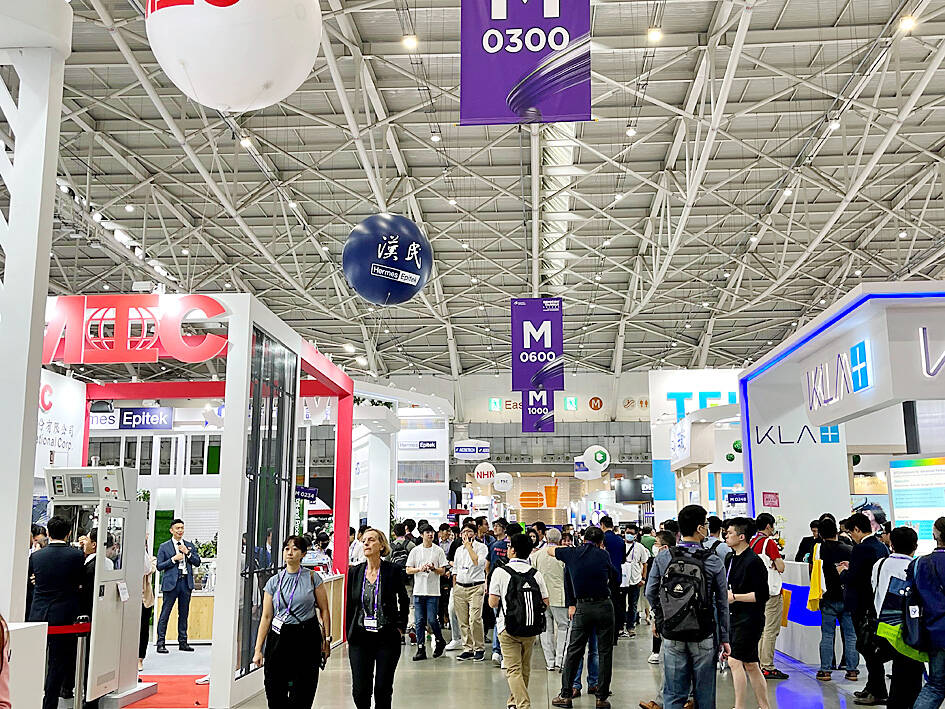Semicon Taiwan, an annual international semiconductor exhibition, would bring leaders from the world’s top technology firms to Taipei this year, the event organizer said.
The CEO Summit is to feature nine global leaders from Taiwan Semiconductor Manufacturing Co (TSMC, 台積電), ASE Technology Holding Co (ASE, 日月光投控), Applied Materials Inc, Google, Samsung Electronics Co, SK Hynix Inc, Microsoft Corp, Interuniversity Microelectronic Centre and Marvell Technology Group Ltd, SEMI said in a news release last week.
The top executives would delve into how semiconductors are positioned as the driving force behind global technological innovation amid the artificial intelligence (AI) revolution, the organizer said.

Photo: Grace Hung, Taipei Times
Among them, Samsung Electronics memory business head Lee Jung-bae and SK Hynix president Justin Kim are to deliver keynote speeches during the summit’s opening on Wednesday.
Lee would share his perspectives on the memory business in his keynote titled “Leaping Into the Future Through Memory Technology Innovation,” while Kim would discuss the AI memory trend, the organizer said.
This year’s event would also feature an AI Chip Fireside Chat, which would focus on semiconductor technology, cross-industry collaboration and future industry dynamics.
The discussions, which would be moderated by ASE chief operating officer Tien Wu (吳田玉) with TSMC, Samsung and Google executives participating, would include how semiconductors are driving global economic growth through AI, as well as the technical challenges and opportunities in chips, algorithms, memory, software, bandwidth, power consumption and system integration, it added.
The forums would feature more than 200 global semiconductor industry leaders, the organizer said.
The organizers expect the gathering to connect experts across various fields to explore how semiconductors would be the driving force behind global technological innovation in the era of AI.
Semicon Taiwan would feature 3,700 booths from more than 1,100 exhibitors from home and abroad, as well as more than 20 international forums, the organizer said.
Twelve countries, including Germany, the UK and the Czech Republic, plan to set up special pavilions at this year’s event, it said, adding that the American Institute in Taiwan (AIT) would also set up a US pavilion for the first time this year.
The annual event is to take place from Wednesday to Friday at the Taipei Nangang Exhibition Center’s halls 1 and 2. It is expected to attract more than 85,000 visitors, the organizer said.

TAKING STOCK: A Taiwanese cookware firm in Vietnam urged customers to assess inventory or place orders early so shipments can reach the US while tariffs are paused Taiwanese businesses in Vietnam are exploring alternatives after the White House imposed a 46 percent import duty on Vietnamese goods, following US President Donald Trump’s announcement of “reciprocal” tariffs on the US’ trading partners. Lo Shih-liang (羅世良), chairman of Brico Industry Co (裕茂工業), a Taiwanese company that manufactures cast iron cookware and stove components in Vietnam, said that more than 40 percent of his business was tied to the US market, describing the constant US policy shifts as an emotional roller coaster. “I work during the day and stay up all night watching the news. I’ve been following US news until 3am

UNCERTAINTY: Innolux activated a stringent supply chain management mechanism, as it did during the COVID-19 pandemic, to ensure optimal inventory levels for customers Flat-panel display makers AUO Corp (友達) and Innolux Corp (群創) yesterday said that about 12 to 20 percent of their display business is at risk of potential US tariffs and that they would relocate production or shipment destinations to mitigate the levies’ effects. US tariffs would have a direct impact of US$200 million on AUO’s revenue, company chairman Paul Peng (彭雙浪) told reporters on the sidelines of the Touch Taiwan trade show in Taipei yesterday. That would make up about 12 percent of the company’s overall revenue. To cope with the tariff uncertainty, AUO plans to allocate its production to manufacturing facilities in

Six years ago, LVMH’s billionaire CEO Bernard Arnault and US President Donald Trump cut the blue ribbon on a factory in rural Texas that would make designer handbags for Louis Vuitton, one of the world’s best-known luxury brands. However, since the high-profile opening, the factory has faced a host of problems limiting production, 11 former Louis Vuitton employees said. The site has consistently ranked among the worst-performing for Louis Vuitton globally, “significantly” underperforming other facilities, said three former Louis Vuitton workers and a senior industry source, who cited internal rankings shared with staff. The plant’s problems — which have not

COLLABORATION: Given Taiwan’s key position in global supply chains, the US firm is discussing strategies with local partners and clients to deal with global uncertainties Advanced Micro Devices Inc (AMD) yesterday said it is meeting with local ecosystem partners, including Taiwan Semiconductor Manufacturing Co (TSMC, 台積電), to discuss strategies, including long-term manufacturing, to navigate uncertainties such as US tariffs, as Taiwan occupies an important position in global supply chains. AMD chief executive officer Lisa Su (蘇姿丰) told reporters that Taiwan is an important part of the chip designer’s ecosystem and she is discussing with partners and customers in Taiwan to forge strong collaborations on different areas during this critical period. AMD has just become the first artificial-intelligence (AI) server chip customer of TSMC to utilize its advanced